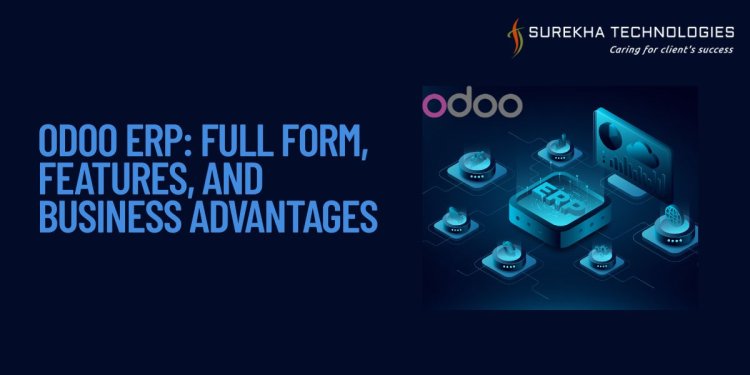Odoo ERP: Full Form, Features, and Business Advantages
Explore the full form, features, and business advantages of Odoo ERP, and see how it can transform your business operations for better performance.

Odoo ERP (Enterprise Resource Planning) is an all-in-one business management software that helps organizations streamline their operations. It provides a wide range of integrated applications that cater to various business needs, including sales, inventory, human resources, accounting, and more. With its modular structure and open-source nature, Odoo has become a popular choice for businesses of all sizes. In this article, we will explore Odoo’s full form, its key features, and the business advantages of implementing Odoo ERP.
What is Odoo ERP?
Odoo stands for On-Demand Open Object, which signifies its flexibility and adaptability to different business requirements. Initially launched as TinyERP in 2005, the platform evolved into OpenERP before being rebranded as Odoo in 2014. Today, Odoo ERP is one of the most widely used enterprise resource planning solutions globally, providing comprehensive business management tools through a user-friendly and customizable interface.
Key Features of Odoo ERP
1. Modular Architecture
One of the biggest strengths of Odoo is its modular design. Businesses can choose from a wide range of applications (modules) based on their specific needs. Some of the most commonly used modules include:
-
Sales & CRM – Manage customer relationships, sales pipelines, and quotations efficiently.
-
Inventory & Manufacturing – Track stock levels, manage procurement, and optimize production workflows.
-
Accounting & Finance – Automate invoicing, tax calculations, and financial reporting.
-
Human Resources (HRMS) – Handle employee records, payroll, recruitment, and leave management.
-
E-commerce & Website – Build and manage online stores with integrated payment gateways.
2. Open-Source and Customizable
Odoo ERP is open-source, allowing businesses to modify and customize the software according to their unique requirements. This flexibility makes it an ideal solution for organizations looking for tailored business management solutions.
3. User-Friendly Interface
Odoo offers an intuitive and modern interface that makes it easy for employees to use without extensive training. The seamless navigation and dashboard customization enhance user experience and productivity.
4. Integration Capabilities
Odoo provides seamless integration with third-party applications such as payment gateways, shipping carriers, and marketing tools. This ensures that businesses can connect all their systems for efficient operations.
5. Cloud and On-Premise Deployment
Odoo offers both cloud-based and on-premise deployment options. Businesses can choose the deployment method that best suits their operational needs and budget.
6. Automation and AI-Powered Insights
Odoo ERP automates repetitive tasks such as invoice generation, email marketing, and inventory updates. Additionally, its AI-powered analytics provide businesses with actionable insights to improve decision-making.
Business Advantages of Odoo ERP
1. Cost-Effective ERP Solution
Unlike traditional ERP systems that come with high implementation costs, Odoo ERP offers a cost-effective alternative. Its open-source nature allows businesses to avoid hefty licensing fees while still benefiting from a feature-rich platform.
2. Enhanced Productivity and Efficiency
With automation, seamless integrations, and real-time data access, businesses can eliminate manual processes and improve operational efficiency. Employees can focus on core business activities, leading to higher productivity.
3. Scalability for Growing Businesses
Odoo ERP is highly scalable, making it suitable for startups, SMEs, and large enterprises. As businesses grow, they can add new modules to accommodate their expanding needs without disrupting existing operations.
4. Improved Customer Relationship Management
Odoo’s CRM module enables businesses to manage customer interactions effectively. Features like lead tracking, automated follow-ups, and sales forecasting help improve customer relationships and increase sales.
5. Data Security and Compliance
Odoo ensures data security by offering role-based access control and encryption features. It also supports compliance with industry regulations such as GDPR, ensuring businesses meet legal requirements.
6. Better Decision-Making with Real-Time Analytics
Odoo provides real-time insights into business performance through advanced reporting and analytics. This allows business owners to make data-driven decisions that enhance growth and profitability.
Conclusion
Odoo ERP is a powerful and flexible business management solution that offers a wide range of features to enhance productivity, efficiency, and scalability. Its modular design, cost-effectiveness, and customization capabilities make it a preferred choice for businesses looking to optimize their operations. Whether you are a small business or a large enterprise, investing in Odoo Development can help streamline your processes and drive long-term success.
What's Your Reaction?


















